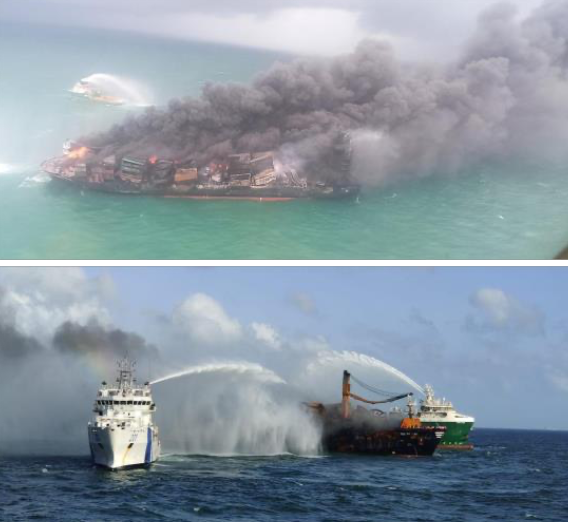News report by Mohammad Omar Malik
Colombo, May 25: On the 25th of May, the Singaporean container ship MV X-Press Pearl caught fire while on route from Hazira, Gujarat, to Colombo, Sri Lanka’s capital. Hazardous chemicals came into contact and reacted. Since then, a fire erupted onboard. The cargo ship, which was anchored 9.5 nautical miles (about 15 km) northwest of Colombo, was carrying 1,486 dangerous nitric acid containers and 325 metric tonnes of fuel, among other things. There were also 25 crew members on board. The Sri Lankan Coast Guard and Marine Environment Protection Authority (MEPA), in coordination with the Indian Coast Guard Services (ICGS), launched an Indo-Sri Lankan joint operation to put out the fire immediately.
Two of IGCSs’ patrol vessels with exterior firefighting capabilities, ‘Vaibhav’ and ‘Vajra’, were immediately deployed and arrived at the incident site on May 26th to assist in putting out the fire. ‘Vajra’ was dispatched from its base in Tuticorin, while Vaibhav was diverted from its patrolling duties. ‘Vaibhav’ and ‘Vajra’, are both capable of spraying 600 litres of seawater per minute. On Saturday, India’s specialised pollution response vessel ‘Samudra Prahari’ which is capable of multi-mission roles like firefighting, containment and recovery of oil spills joined the operation to help with pollution control. Aircraft Dormier of the ICGS conducted air surveillance and reported that no oil leak had occurred. Sri Lanka has also sent four tugboats to help in the combined operation. A tugboat is a small, strong boat that is used to tow larger boats and ships, especially in harbours. The firefighting operation was hampered by strong winds and choppy seas caused by the cyclone. As the ship slanted slightly, some ten containers containing hazardous chemicals were spilled into the sea. ICGS bases in Kochi, Chennai, and Tuticorin are on the alert for any additional assistance.
The fire is largely under control as a result of this joint operation. On Tuesday, the ship’s whole crew of 25 was rescued. The ship’s hull and bunker tanks are both structurally sound, and no oil has spilled into the port waters. The likelihood of the ship sinking has decreased significantly, averting potential environment damage.
The ICGS’s support in putting out the fire is in keeping with the Indian government’s Neighbourhood First policy, which calls for reacting to maritime concerns such as natural disasters in order to improve the region’s prosperity, safety, and progress.


